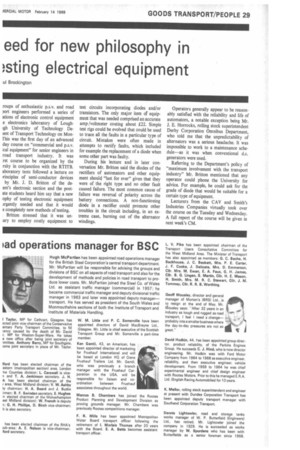eed for new philosophy in sting electrical equipment
Page 31

If you've noticed an error in this article please click here to report it so we can fix it.
ul Brockington roups of enthusiastic p.s.v. and road 3ort engineers performed a series of ations of electronic control equipment e electronics laboratory of Lough.0 University of Technology Delent of Transport Technology on MonThis was the first day of an advanced day course on "commercial and p.s.v. cal equipment" for senior engineers in road transport industry. It was rst course to be organized by the rsity in conjunction with the RTITB. aboratory tests followed a lecture on ■ rinciples of semi-conductor devices by Mr. J. D. Britton of the deent's electronic section and the postate students heard him say that a new ophy of testing electronic equipment irgently needed and that it would e completely new methods of testing.
• Britton stressed that it was unary to employ costly equipment to test circuits incorporating diodes and/or transistors. The only major item of equipment that was needed comprised an accurate amp /voltmeter costing about £22. Simple test rigs could be evolved that could be used to trace all the faults in a particular type of circuit. Mistakes were often made in attempts to rectify faults, which included for example the replacement of a diode when some other part was faulty.
During his lecture and in later conversation Mr. Britton said the diodes of the rectifiers of automators and other equipment should "last for ever" given that they were of the right type and no other fault caused failure. The most common cause of failure was reversal of polarity across the battery connections. A non-functioning diode in a rectifier could promote other troubles in the circuit including, in an extreme case, burning out of the alternator windings. Operators generally appear to be reasonably satisfied with the reliability and life of automators, a notable exception being Mr. J. E. Horrocks, rolling stock superintendent Derby Corporation Omnibus Department, who told me that the unpredictability of alternators was a serious headache. It was impossible to work to a maintenance schedule—as it was when conventional d.c. generators were used.
Referring to the Department's policy of "maximum involvement with the transport industry" Mr. Britton mentioned that any operator could phone the University for advice. For example, he could ask for the grade of diode that would be suitable for a certain type of equipment.
Lecturers from the CAV and Smith's Industries Companies virtually took over the course on the Tuesday and Wednesday. A full report of the course will be given in next week's CM.


















































































































